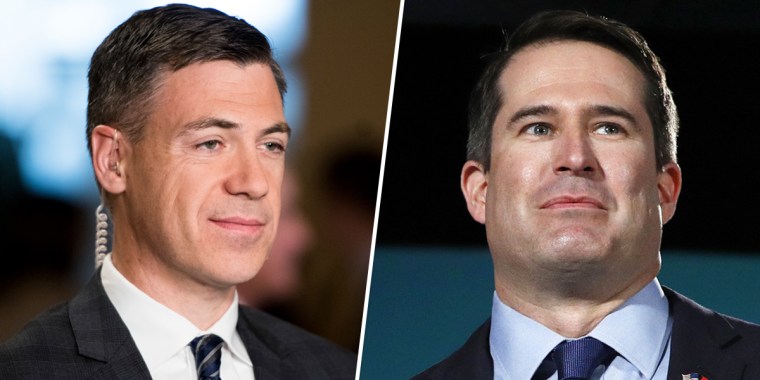House members introduced a resolution Tuesday that would condemn China for its handling of the COVID-19 pandemic.
The legislation, initially spearheaded by Reps. Jim Banks, R-Ind., and Seth Moulton, D-Mass., accuses the Chinese government of having made multiple "serious mistakes," including the deliberate perpetuation of misinformation to downplay virus risks and the censorship of doctors and journalists in the nascent stages of the outbreak. But Moulton announced on Thursday that he is withdrawing his support of the resolution.
Those actions, the resolution says, "heightened" the severity and spread of COVID-19, the disease caused by the coronavirus. The measure demands that the Chinese government "publicly state that there's no evidence that COVID–19 originated anywhere else but China."
However, the resolution has prompted criticism from many lawmakers who argued that it could put Asian Americans and Pacific Islanders in harm's way by perpetuating the racist association of the virus with Chinese people. The community has seen an increase in coronavirus-related attacks, correlating with the spread of the illness.
"During a pandemic like this, people are afraid and angry, and directing that anger towards China puts AAPIs at risk, as we have already seen with the insults and assaults against them," Rep. Judy Chu, D-Calif., chairwoman of the Congressional Asian Pacific American Caucus, told NBC News in a statement.
Full coverage of the coronavirus outbreak
Chu contacted Banks and Moulton on Tuesday to ask them to drop or amend the bill. In addition to announcing his withdrawal from the legislation, Moulton, who is self-quarantining after having experiencing some COVID-19 symptoms, has since said he apologizes for the division the legislation has prompted. He said that he initially supported the resolution because he believed it important to "highlight the playbook that authoritarian governments like China use, so that we can also call out President Trump for using many of the same tactics here at home."
"Instead, the resolution has caused division, the substance overshadowed by President Trump’s divisive, xenophobic attempts to deflect from his administration’s abysmal response to this virus. I’ve heard this from many friends and colleagues, particularly members of the Asian-American community, who were hurt at a time when their community is under assault by racists in our own country," he said. "As someone who has spoken in stark terms about racism in America and the dangerousness of Trump, the way the resolution has been used is unacceptable to me."
Banks refused Chu's suggestions, telling NBC News that "of course, no one should make the mistake of believing that members of the Asian American community or Chinese citizens are responsible for or associated with the Chinese government's lies. Anyone not able to make that distinction would be guilty of discrimination."
However, public health officials, including the World Health Organization, have cautioned against linking the illness with a location or an ethnicity. The WHO revised its own naming conventions in 2015 to avoid the unintended consequences of stigmatizing certain communities or industries.
Since the start of the outbreak, Asian Americans have confronted attacks and violence related to the virus. People across the country have been hospitalized because of the virus-prompted racism, including a 23-year-old woman in New York City who was alleged to have been punched in the face as her attackers invoked anti-Asian slurs. In California, an Asian teen was sent to the emergency room after he was bullied and assaulted.
Download the NBC News app for full coverage and alerts about the coronavirus outbreak
The resolution also calls on the Chinese government to denounce the conspiracy theory, floated by Chinese Foreign Ministry spokesman Zhao Lijian, that the U.S. Army brought the epidemic to Wuhan, the center of the outbreak. In addition, it demands the end to the country's detainment of Uighur Muslims in prison camps, which the government has claimed are vocational centers, as well as for China to reverse its decision to expel some American journalists.
Both the U.S. and Chinese governments have passed blame back and forth. U.S. officials, including Secretary of State Mike Pompeo and President Donald Trump himself, have upped their use of the terms "Chinese virus" and "Wuhan virus," framing the outbreak as a Chinese issue. Pompeo urged G-7 leaders to adopt the language, as well, according to a report from the German magazine Der Spiegel. They've also accused Beijing of withholding information.
Similarly, Chinese officials have regularly criticized the U.S. handling of the virus and played up America's failures around the outbreak, in addition to expelling American journalists and perpetuating the Army conspiracy.
"I think many people, when the pandemic first started, thought this is an opportunity for global cooperation," Matthew Kroenig, who teaches at Georgetown University's School of Foreign Service, told CNN. "What we've seen instead is that it's just become a new arena for this great-power rivalry to play out."
